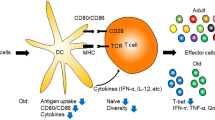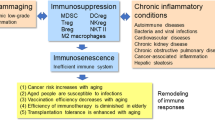Abstract
Because cancer is associated with aging, immunological features in the aged should be considered in anticancer immunotherapy. In this study, we investigated antitumor immunity in aged mice using a CT26 colon carcinoma model. The tumor growth of CT26 was accelerated in aged mice compared with that in young mice, but this difference was not observed in nude mice. The serum levels of IL-6 and TNF-α were higher in aged mice than those in young mice, irrespective of the CT26-bearing state. The in vitro induction of CT26-specific CTLs from aged mice that were vaccinated with doxorubicin (DTX)-treated CT26 cells was impaired. In vivo neutralization of IL-6, but not TNF-α, showed a tendency to restore the in vitro induction of CT26-specific CTLs from vaccinated aged mice. Analyses on tumor-infiltrating immune cells as early as day 5 after CT26 inoculation revealed that monocytic and granulocytic MDSCs preferentially infiltrated into tumor sites in aged mice compared with young mice. Alternatively, oral administration of Lentinula edodes mycelia (L.E.M.) extract, which has the potential to suppress inflammation in tumor-bearing hosts, decreased the serum levels of IL-6 in aged mice. When administration of L.E.M. extract was started 1 week earlier, CT26 growth was retarded in aged mice and the in vivo priming of tumor-specific CTLs was improved in CT26-vaccinated aged mice. These results indicate early infiltration of MDSCs is related to impaired immunity of aged hosts and that oral administration of L.E.M. extract can mitigate the impairment.






Similar content being viewed by others
Abbreviations
- DTX:
-
Doxorubicin
- L.E.M.:
-
Lentinus edodes mycelia
- Th1:
-
Type I helper
- Treg:
-
Regulatory T cell
References
Lustgarten J (2009) Cancer, aging and immunotherapy: lessons learned from animal models. Cancer Immunol Immunother 58:1979–1989
Taub DD, Longo DL (2005) Insights into thymic aging and regeneration. Immunol Rev 205:72–93
Song I, Kim Y, Chopra R et al (1993) Age-related effects in T cell activation and proliferation. Exp Gerontol 28:313
Engwerda C, Fox B, Handwerger B (1996) Cytokine production by T lymphocytes from young and aged mice. J Immunol 156:3621
Bloom E, Umehara H, Bleackley R et al (1990) Age-related decrement in cytotoxic T lymphocyte (CTL) activity is associated with decreased levels of mRNA encoded by two CTL-associated serine esterase genes and the perforin gene in mice. Eur J Immunol 20:2309
Thoman M (1997) Effects of the aged microenvironment on CD4+ T cell maturation. Mech Ageing Dev 96:75–88
Saurwein-Teissl M, Romani N, Grubeck-Loebenstein B (2000) Dendritic cells in old age- neglected by gerontology? Mech Ageing Dev 121:123
Nishioka T, Shimizu J, Iida R et al (2006) CD4+ CD25+ Foxp3+ T cells and CD4+ CD25+ Foxp3+ T cells in aged mice. J Immunol 176:6586–6593
Sharma S, Dominguez A, Lustgarten J (2006) High accumulation of T regulatory cells prevents the activation of immune responses in aged animals. J Immunol 177:8348–8355
Grizzle W, Xu X, Zhang S et al (2007) Age-related increase of tumor susceptibility is associated with myeloid-derived suppressor cell mediated suppression of T cell cytotoxicity in recombinant inbred B × D12 mice. Mech Ageing Dev 128:672–680
Tsukamoto H, Senju S, Matsumura K et al (2015) IL-6-mediated environmental conditioning of defective Th1 differentiation dampens antitumour immune responses in old age. Nat Commun 6:6702–6716
Spaulding CC, Walford RL, Effros RB (1997) Calorie restriction inhibits the age-related dysregulation of the cytokines TNF-α and IL-6 in C3B10RF1 mice. Mech Ageing Dev 93:87–94
Tomihara K, Shin T, Hurez VJ et al (2012) Aging-associated B7-DC+ B Cells enhance anti-tumor immunity via Th1 and Th17 induction. Aging Cell 11:128–138
Donin N, Sinai J, Staroselsky A et al (1997) Comparison of growth rate of two B16 melanomas differing in metastatic potential in young versus middle-aged mice. Cancer Invest 15:416–421
Kanno J, Wakikawa A, Utsuyama M et al (1997) Effect of restraint stress on immune system and experimental B16 melanoma metastasis in aged mice. Mech Ageing Dev 93:107–117
Itzhaki O, Kaptzan T, Skutelsky E et al (2004) Age-adjusted antitumoral therapy based on the demonstration of increased apoptosis as a mechanism underlying the reduced malignancy of tumors in the aged. Biochim Biophys Acta 1688:145–159
Philip M, Rowley DA, Schreiber H (2004) Inflammation as a tumor promoter in cancer induction. Semin Cancer Biol 14:433–439
Cahlin C, Körner A, Axeisson H et al (2000) Experimental cancer cachexia: the role of host-derived cytokines interleukin (IL)-2, IL-12, interferon-gamma, and tumor necrosis factor alpha evaluated in gene knockout, tumor-bearing mice on C57Bl background and eicosanoid-dependent cachexia. Cancer Res 60:5488–5493
Liu Q, Tan Q, Zheng Y et al (2014) Blockade of fas signaling in breast cancer cells suppresses tumor growth and metastasis via disruption of fas signaling-initiated cancer-related inflammation. J Biol Chem 289:11522–11535
Bunt SK, Yang L, Sinha P et al (2007) Reduced inflammation in the tumor microenvironment delays the accumulation of myeloid-derived suppressor cells and limits tumor progression. Cancer Res 67:10019–10026
Tsukamoto H, Nishikata R, Senju S et al (2013) Myeloid-derived suppressor cells attenuate TH1 development through IL-6 production to promote tumor progression. Cancer Immunol Res 1:64–76
Tanaka K, Ishikawa S, Matsui Y et al (2011) Oral ingestion of Lentinula edodes mycelia extract inhibits B16 melanoma growth via mitigation of regulatory T cell-mediated immunosuppression. Cancer Sci 102:516–521
Tanaka K, Ishikawa S, Matsui Y et al (2012) Combining a peptide vaccine with oral ingestion of Lentinula edodes mycelia extract enhances anti-tumor activity in B16 melanoma-bearing mice. Cancer Immunol Immunother 61:2143–2152
Tanaka K, Matsui Y, Ishikawa S et al (2012) Oral ingestion of Lentinula edodes mycelia extract can restore the antitumor T cell response of mice inoculated with colon-26 cells into the subserosal space of the cecum. Oncol Rep 27:325–332
Kojima H, Akaki J, Nakajima S et al (2010) Structural analysis of glycogen-like polysaccharides having macrophage-activating activity in extracts of Lentinula edodes mycelia. J Nat Med 64:16–23
Huang AY, Gulden PH, Woods AS et al (1996) The immunedominant major histocompatibility complex class I-restricted antigens of a murine colon tumor derives from an endogenous retroviral gene product. Proc Natl Acad Sci USA 93:9730–9735
Youn JI, Nagaraj S, Colloazo M et al (2008) Subsets of myeloid-derived suppressor cells in tumor-bearing mice. J Immunol 181:5791–5802
Sinha P, Parker KH, Horn L et al (2012) Tumor-induced myeloid-derived suppressor cell function is independent of IFN-γ and IL-4Rα. Eur J Immunol 42:2052–2059
Ostrand-Rosenberg S, Sinha P (2009) Myeloid-derived suppressor cells: linking inflammation and cancer. J Immunol 182:4499–4506
Beury DW, Parker KH, Nyandio M et al (2014) Cross-talk among myeloid-derived suppressor cells, macrophages, and tumor cells impacts the inflammatory milieu of solid tumors. J Leukoc Biol 96:1109–1118
Boehmer ED, Goral J, Faunce DE et al (2004) Age-dependent decrease in Toll-like receptor 4-mediated proinflammatory cytokine production and mitogen-activated protein kinase expression. J Leukoc Biol 75:342–349
Chelvarajan RL, Collons SM, Van Willigen JM et al (2005) The unresponsiveness of aged mice to polysaccharide antigens is a result of a defect in macrophage function. J Leukoc Biol 77:503–512
Bouchlaka MN, Sckisel GD, Chen M et al (2013) Aging predisposes to acute inflammatory induced pathology after tumor immunotherapy. J Exp Med 210:2223–2237
Kohman RA, Crowell B, Kusnecov AW (2010) Differential sensitivity to endotoxin exposure in young and middle-age mice. Brain Behav Immun 24:486–492
Mirsoian A, Bouchalaka MN, Sckisel GD et al (2014) Adiposity induces lethal cytokine storm after systemic administration of stimulatory immunotherapy regimens in aged mice. J Exp Med 211:2373–2383
Young MR, Kolesiak K, Achille NJ et al (2001) Impact of aging on immune modulation by tumor. Cancer Immunol Immunother 50:315–320
Tesniere A, Apetoh L, Ghiringhelli F et al (2008) Immunogenic cancer cell death: a key–lock paradigm. Curr Opin Immunol 20:504–511
Tongu M, Harashima N, Yamada T et al (2010) Immunogenic chemotherapy with cyclophophamide and doxorubicin against established murine carcinoma. Cancer Immunol Immunother 59:769–777
Zhou Y, Bosch ML, Salgaller ML (2002) Current methods for loading dendritic cells with tumor antigen for the induction of antitumor immunity. J Immunother 25:289–303
McIlroy D, Gregoire M (2003) Optimizing dendritic cell-based anticancer immunotherapy: maturation state does have clinical impact. Cancer Immunol Immunother 52:583–591
Gorelik L, Bar-Dagan Y, Mokyr MB (1996) Insight into the mechanism(s) through which TNF promotes the generation of T cell-mediated antitumor cytotoxicity by tumor bearer splenic cells. J Immunol 156:4298–4308
Ratner A, Clark WR (1993) Role of TNF-α in CD8+ cytotoxic T lymphocyte- mediated lysis. J Immunol 150:4303–4314
Yoshioka Y, Tamesada M, Nagayama A (2009) The Safety of Excessive Intake of the Food Containing Extract of Cultured Lentinula edodes Mycelia (L.E.M.) in Healthy Adult Volunteers. JCAM 6:9–15 (in Japanese.)
Acknowledgments
The authors are grateful to Ms. Tamami Moritani for her technical assistance. This study was supported in part by JSPS KAKENHI Grant (No. 25430150 to N. Harashima, and No. 24501331 to M. Harada) and from the Shimane University “SUIGANN” Project.
Author information
Authors and Affiliations
Corresponding author
Ethics declarations
Conflict of interest
Mamoru Harada received donations for research from the Kobayashi Pharmaceutical Co., Ltd. All other authors declare that they have no conflict of interest.
Electronic supplementary material
Below is the link to the electronic supplementary material.
Rights and permissions
About this article
Cite this article
Ishikawa, S., Matsui, Y., Wachi, S. et al. Age-associated impairment of antitumor immunity in carcinoma-bearing mice and restoration by oral administration of Lentinula edodes mycelia extract. Cancer Immunol Immunother 65, 961–972 (2016). https://doi.org/10.1007/s00262-016-1857-y
Received:
Accepted:
Published:
Issue Date:
DOI: https://doi.org/10.1007/s00262-016-1857-y




